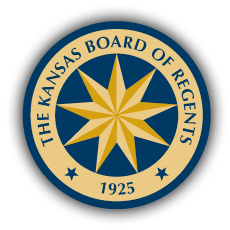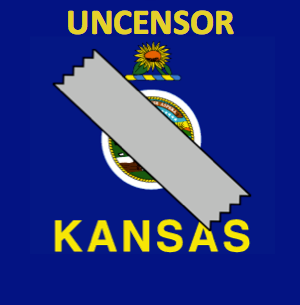
The reviews are in, and they’re good. The Social Media Policy Workgroup‘s revision to the Kansas Board of Regents’ social media policy has won near-unanimous praise. People are saying things like:
“reasonable”
– Chuck Epp, co-chairman of the Workgroup and Professor of Public Affairs, University of Kansas (he is summarizing the response thus far).
“entirely appropriate”
– Susan Twombly, Professor of Education, University of Kansas
“a vast improvement”
– Chris Steadham, Faculty Senate President, University of Kansas
“It begins and ends by affirming academic freedom.”
– Philip Nel, Professor of English, Kansas State University
(Yes, that last one is me.) It’s unusual to have such wide agreement among academics. Because the revised policy is so sound, critics of the Kansas Board of Regents’ current policy have mostly been holding their tongues, hoping that the Regents will heed the advice they’ve solicited. On April 16th, the Workgroup will present the new policy to the Regents, and on May 14th the Regents will let us know whether they’ll accept the recommended changes.
As we await their decision, it’s worth remembering that the Kansas Board of Regents’ current social media policy has met with near universal disdain. Indeed, that disdain is currently what the board is best known for. Type in “Kansas Board of Regents” into Google, and this is what you get:
Yes, Google only suggests “social media” and “social media policy” as related terms, which in and of themselves do not convey the disdain. However, if you take those suggestions and read some of the search results, you find plenty of criticism, much of it withering. Most recently, the Kansas Board of Regents won a Jefferson Muzzle Award:
The Regents adopted this first-of-its-kind policy without consulting university leaders or faculty who, unsurprisingly, were not pleased. … Reaction to the policy from national academic freedom advocates was also negative. The American Association of University Professors described the policy as “a gross violation of the fundamental principles of academic freedom that have been a cornerstone of American higher education for nearly a century,” while the Student Press Law Center warned that the “breathtaking” sweep of the regulation evidenced “an eagerness to control the off-the-clock lives of employees that is itself cause for suspicion.”
… The Board of Regents could have issued a strong signal of support for the principles of academic freedom and free expression by suspending the current social media policy and pledging to implement the workgroup’s recommendations. Instead, 36 member schools are left sitting below a virtual sword of Damocles, waiting to see how–or even if–the Regents will remove it. This 2014 Jefferson Muzzle is therefore awarded to the Kansas Board of Regents in hopes that First Amendment principles will guide them in resolving this issue as well as those they may face in the future.
The only people speaking out in favor of the policy have been the Regents themselves, and the occasional representative from the Kansas Legislature – a group that, in its current term, has pursued laws making it easier to hit children, legalizing discrimination against gays, nullifying federal environmental laws, and nullifying federal gun laws. (In sum, if Kansas legislators are your only allies, you may want to rethink your position.) Here’s a sampling of what people have said about the Regents’ current social media policy:
I can’t imagine how that would hold up in court. How do you measure harmony among co-workers? To the extent that you can, how do you prove causality? And what about when the “harmony” is either forced – as it almost certainly would be under this policy – or, worse, a form of delusional groupthink? What if the groupthink involves, say, discrimination?
– Matt Reed, “A Lump of Coal for Kansas,” Inside Higher Ed, 19 Dec. 2013.
Does your job own your civil liberties when you’re off the clock? Does it own your thoughts, expressed freely, when you’re home? Are we saying that the government can’t abridge your constitutional rights, but that The Brand can? If you answer instantly, “yes,” think again about what you’re saying, and about the kind of country in which you want to live.
– Charles P. Pierce, “The Tyranny of the Brand,” Esquire: The Politics Blog, 19 Dec. 2013.
In giving university leaders the authority to discipline or terminate even tenured professors for vague, subjective offenses, the regents have set up a chilling environment that runs contrary to the ideal of academic freedom.
– “Kansas Board of Regents social media rules imperil free speech,” Kansas City Star, 20 Dec. 2013.
Whatever threat is posed by social media at state universities should be balanced against the threat of those universities becoming known as places that don’t tolerate the free flow of ideas among their faculty and staff. The possibility that the policy could affect universities’ ability to recruit and retain top faculty members seems like a reasonable concern.
– “Editorial: Curbing Speech,” Lawrence Journal-World, 22 Dec. 2013.
It’s an anti-free speech manifesto that sounds like a pronouncement from the government of a banana republic. The Board of Regents truly should back up, take a deep breath, and decide on something that meets the needs of its great universities.
– “New Regents policy really bad idea,” Manhattan Mercury, 22 Dec. 2013.
The regents seem to have milked the Guth incident for maximum possible censorship, and now the verboten also extends to statements that are “contrary to the best interests of the university” or anything that “impairs discipline by superiors or harmony among coworkers.” It is these two phrases’ ominously wide reach–and overt insistence on lockstep fealty–that are legitimately terrifying. … Of course, the regents may think they’re stemming a rising tide of inflammatory violence-tweets, but in reality theirs is an outsized, reactionary maneuver that harnesses hysteria to further a repressive agenda.
– Rebecca Schuman, “The Brave New World of Academic Censorship: If you’re a professor in Kansas, better stay off the Internet,” Slate, 22 Dec. 2013.
And because of the public role these universities serve, threatening to fire professors and staff members if they post something on social media that is “contrary to the best interests of the university” violates free speech rights and becomes a First Amendment issue.
– “Our View: Kansas regents overreach,” Joplin Globe, 28 Dec. 2013
At its heart, the Kansas policy exemplifies a larger problem afflicting all of government — the hair-trigger use of punitive authority whenever the agency’s public image is imperiled. At many, if not most, government agencies today, it is easier to get fired for making the agency look bad than for actually doing your job badly.
– Frank D. LoMonte, “A Dangerous Policy,” Inside Higher Ed, 2 Jan. 2014.
The policy stifles free expression, adversely affects morale at all universities, makes it harder for us to recruit top-tier faculty, and indeed makes it likely that our own faculty will seek work elsewhere. If we lack the ability to debate controversial ideas, we cannot do our jobs as teachers or scholars.
– “Distinguished Professors from KU and KSU: Open Letter to the Kansas Board of Regents.” This ad ran in the Manhattan Mercury, the Lawrence Journal-World, and the Topeka Capital Journal on 12 Jan. 2014.
if the new policy is implemented, professors could be subject to termination if their disagreement is professed too loudly, or in the wrong way, or even at all.
Fortunately, I happen to be writing from the relative safety of Texas, where repressive tactics like those proposed in Kansas haven’t — as yet — gained much purchase. But I wonder whether, if I raised these same modest objections in Wichita or Topeka, I could be subject to termination. No wonder the Kansas professoriate and the American Association of University Professors are pushing back. The essential nature of the university — in Kansas and elsewhere — is at risk.
– John M. Crisp, “A university isn’t a business, even in Kansas,” The Gulf Today [United Arab Emirates], 4 Feb. 2014.
There’s an abundance of negative reviews – student governments, faculty senates, and many others have called for the policy’s suspension or removal. I’ve not included all here. If you’re interested, you might peruse this more extensive list of press coverage, at the bottom of my original post on the subject.
If they elect to retain the current policy or make only cosmetic modifications to it, the Kansas Board of Regents can expect more bad press. So, I hope the Regents will adopt the carefully revised policy, created by the workgroup that they formed. Â They have a golden opportunity to make Kansas famous for thoughtfulness, and to offer a model social media policy for other universities to emulate.
Will they do the right thing? I guess we’ll find out on May 14th. Until then, our rights remain tenuous, at best. Even though the days are getting warmer, a chilling climate persists on the campuses of Kansas universities.
Image sources: Kansas Board of Regents, Google search for “Kansas Board of Regents,” Uncensor Kansas (Facebook page). On Facebook, there’s also the more active group, Kansas Universities’ Faculty & Staff Against Regents’ Speech Policy.
A more comprehensive list of relevant links can be found here, and of course there are several posts on this blog tagged Kansas Board of Regents.



Jonathan Dresner
Pingback: Yesterday in Manhattan, July 3 | Physical Flaws